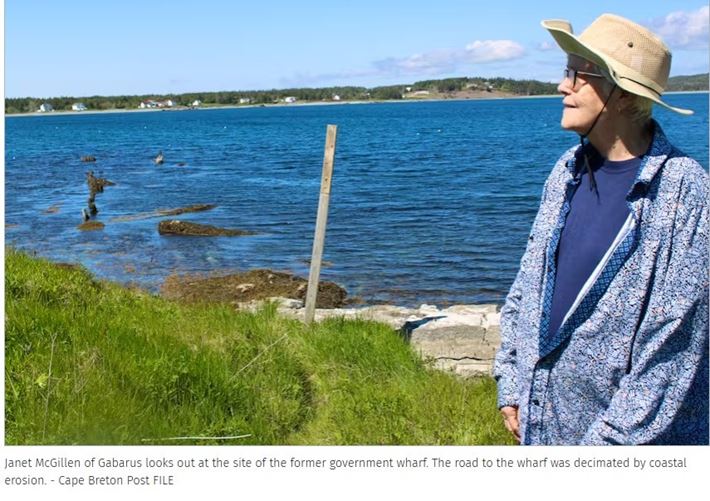FROM THE CAPE BRETON POST
Imagine if a provincial government came along and said that we don’t need to implement provincial building code standards or labour standards, despite public support for them.
Imagine the same provincial government implying that everyone – not just most people -- can be trusted to figure out their own appropriate standards.
Imagine the government wanting us to believe that there will be no free riders: Everyone will avoid cutting corners and putting their neighbours at risk.
What’s more, everyone will supposedly take the time and spend the money to become familiar with the relevant science and acquire the necessary technical expertise.
If, by chance, someone acts recklessly or can’t figure out the technical stuff, then local governments can take care of it if they wish. The province, for its part, will put out a grade-four level workbook with some concepts and ideas for people to consider.
Costly decision
Sadly, this is essentially what Premier Tim Houston has done with the Coastal Protection Act, the long-overdue 2019 statute for our ravaged and increasingly threatened coastlines.
Houston’s decision not to “proclaim” (put into effect) the Act will prove to be costly.
It might even come to define this government’s legacy..
Nova Scotia has 13,000 kilometres of coastline. About 70 per cent of Nova Scotians live in coastal communities. People are at risk.
As leader of the opposition, Houston supported the Coastal Protection Act when it passed the legislature. He promised the people of Nova Scotia to implement it and release specific regulations to accompany the Act.
First, his government delayed the implementation date. And then he walked away from the Act altogether, downloading most of the work to individuals and municipalities.
Timothy Halman, the environment minister who sidestepped the implementation homework, was elevated to deputy premier just before the current election campaign began.
Protection zones
At the core of the Coastal Protection Act is a coastal protection zone. The zone lies “to the seaward of the ordinary high-water mark” and includes the adjacent landward sites.
Construction or coastline alterations within the zone would have to avoid making other properties – or whole communities -- more prone to erosion or storm damage.
Construction or coastline alterations within the zone would have to avoid impinging on sensitive habitats found on neighbouring properties.
This is standard fare in many democratic coastal jurisdictions.
When Bill 106 went before the House of Assembly for third reading on April 11, 2019, MLA Brad Johns spoke on behalf of Houston’s Progressive Conservative party, then the official opposition.
Johns explained that his caucus would support the bill: “We do recognize the good that it will do in regard to global warming and rising sea levels.”
In fact, the PCs tried unsuccessfully to amend the bill to get it implemented sooner!
As Johns explained: “That amendment was to ensure that regulations and mapping were done as soon as possible so that the bill could go into effect.”
The PCs argued that the then-estimated 12 to 18 months was too long to wait.
Fast forward to 2024. Municipalities, which had been anticipating the province’s protective parameters, are struggling to figure out their next move.
In June 2023 – when implementation of the Act was being delayed, but had not yet been abandoned – the Municipality of Chester, among others, wrote letters expressing serious concerns to Minister Halman.
Chester’s letter said: “In response to more than $385 million in damage from Hurricane Fiona, you pledged in the fall of 2022 that Coastal Protection Act regulations would come into effect in the first half of this year.”
It never happened.
Lessons
At this very moment, some parts of the world are learning hard lessons.
Over the past month, public outrage has shaken governments in Spain to the core. Massive flooding, especially around Valencia, has taken more than 200 lives.
There is fury over the disorganized immediate response.
But the Spanish public has also realized something else: In recent years, governments directly failed to move on promised safety and prevention measures for coastal and watershed protection.
Policy makers had declined to work with engineers to appropriately guide development in at-risk zones.
Lives were lost as a result. And now, disaster relief and compensation will overwhelm the public finances.
It was a dramatic failure of leadership – a permanent stain on those delinquent governments.
Please, let’s do better here.
Dr. Tom Urbaniak, professor of political science and director of the Tompkins Institute at Cape Breton University, is the author of six books, including, most recently, In the Public Square: A Citizen’s Reader.
Article in Cape Breton Post for 19Nov2024





2
Log In or Sign Up to add a comment.- 1
arrow-eseek-e1 - 2 of 2 itemsFacebook Comments